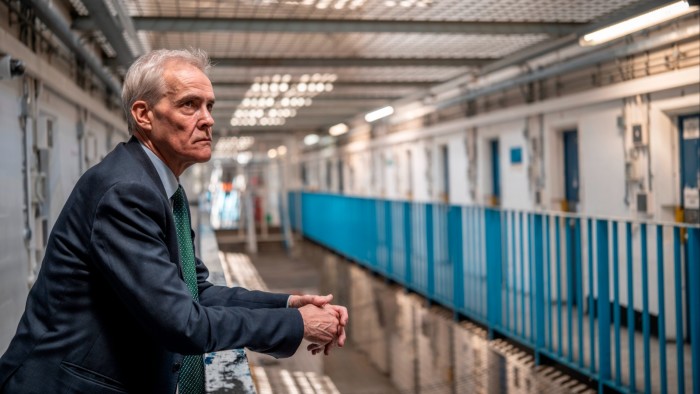Ministers must devolve more powers to prison governors and align the “free-spinning cogs” of the justice system in England and Wales if they want overcrowding and reoffending rates to fall, the sector’s chief inspector has warned.
Charlie Taylor said jails remained “massively overcrowded” despite “expedient decisions” by the government to ease a capacity crunch over the past year, and that a better prison system required more staff autonomy and rehabilitation opportunities for inmates.
“The amount of central control is absolutely staggering,” he told the FT. “Governors are not able to make decisions about some really basic stuff, like buying a new washing machine. We mandate mediocrity . . . [but] you can’t run a prison system by turning dials on a big machine in Whitehall.”
The comments by His Majesty’s chief inspector come ahead of the publication on Tuesday of his annual report into prisons, which are still beset by chronic overcrowding a year after ministers set out emergency measures to release thousands of offenders early.
“We talk about it as a justice system, but it is actually a lot of pretty loosely collected systems,” he added. “The cogs don’t lock together and they are kind of spinning freely . . . Finding ways in which courts, prisons and probation can work better is really important.”
At the end of June there were about 87,300 prisoners in England and Wales and just 2,200 available places, according to the Ministry of Justice. Inmate numbers have doubled over the past 30 years as successive governments introduced longer sentences, while pandemic-induced backlogs in the court system have led to a sharp rise in those on remand.
Summarising the inspectorate’s work over the past 12 months, the report is expected to highlight an increase in violence and the use of drones to deliver drugs to prisoners, as well as ageing buildings and persistently poor work and education opportunities for men and women spending too long in their cells.
Taylor, who has been in post since 2020, said illicit substances were “the biggest driver of violence” and entering prisons “at enormously high rates” via drones, which had in some cases also supplied knives.
The biggest package he had come across weighed 11kg and contained a “menu” of mobile phones, cannabis and other drugs, while another had been wrapped in AstroTurf to help it blend in on landing.

Yet even as drones became “ever more sophisticated”, Taylor warned that the response of the prison service was “not dynamic and fast enough”.
Jails had “to go through the same clunky procurement exercises” to strengthen defences as they did to buy white goods, and neither institutions nor the prison service paid enough attention to the link between rule-breaking and how people behind bars spent their time, he said.
“We are now spending more than £57,000 a year to lock a person up and we’re just not getting value for money in terms of the potential for rehabilitation,” Taylor added.
“[My team and I] still go to lots of places where classrooms and workshops are empty and getting prisoners into activity is not really a priority,” he said, even though “one of the ways you make prisons safer is by having prisoners do something productive with their time”.
The MoJ said it was building 14,000 extra prison places and reforming sentencing “so we never run out of prison places again”.
“To keep the public safe, we are also boosting probation funding by 45 per cent,” it added.
In May justice secretary Shabana Mahmood set out the biggest penal policy shake-up in decades, including allowing some offenders to leave custody after one-third of their sentence, following an independent review by David Gauke, former Conservative justice secretary.
“This country must never run out of prison places again,” she told MPs at the time, urging judges to avoid imposing custodial sentences lasting less than one year.

Taylor said the prison service had done an “amazing job” putting in place the early release scheme last year and “anything that bears down on the prison population is a good thing”. But the government needed to ensure letting offenders out part way through their term did not worsen rates of recidivism, he stressed.
“It’s all very well releasing prisoners early, but if the services in the community can’t look after them properly, then the danger is they are going to get pulled back into custody, but also the public’s faith in the justice system is affected if they are getting out and committing further offences.”
Cautioning against a blanket policy of community-based sentences for low-level offenders and the “luxury belief” of not sending women to jail, he added that ministers’ plans for three new prisons would need to account for hiring pressures and the difficulty of “creating an institutional culture from scratch”.
After a wave of attacks on staff by inmates led to calls for more protection for officers, Taylor said the inspectorate did not have “a doctrinaire position on personal protection” such as body armour or Tasers, which are being trialled this summer. “Security measures have their place if they are used proportionately in the right circumstances,” he added.
Taylor cited efforts by “really effective prisons” such as Oakwood near Wolverhampton, operated by security group G4S, and Send, a publicly run facility for women in Surrey, to offer inmates higher than average time outside cells, decent living conditions and meaningful opportunities to rehabilitate.
“There are places that are able to do it despite all the pressures. It isn’t always just about the money; the service as a whole doesn’t really learn from who’s doing well,” he said. “It’s very easy to think all prisons are a complete car crash . . . but we have enough great role models out there to be able to turn things around.”




